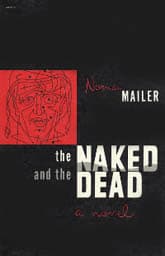The Naked and the Dead
Critique • Quotes • At the movies
 First edition
First editionFirst publication
1948
Literature forms
Novel
Genres
Literary
Writing language
English
Author's country
United States
Length
Approx. 300,000 words
Fuggin' great war story
This was hailed by Time as the best novel about the Second World War. And for once, Time might have had it right. If we add the qualifier "American" between "best" and "novel".
I was surprised in reading Norman Mailer's war novel recently to find how well it holds up. In fact, I liked it more now than I had when I'd first read it many years earlier. The first reading may have unfairly compared The Naked and the Dead to war stories by Ernest Hemingway, Erich Maria Remarque and others after the First World War. The title even sounds Hemingwayesque.
But the prose is less sculpted than Hemingway's, scenes could be edited out (it's a very long book), and the tone is very different.
The "lost generation" of the 1920s was cynical about its war experiences but, particularly in the writing of Hemingway, the authors held to a personal code of honour. Mailer's soldiers, however, learn that no code is worth anything in the face of war. They end up hopeless individuals, trusting nothing.
The story takes place on a Pacific island during battles between the Americans and the Japanese. Death comes indiscriminately to both gentle and vicious characters. And it comes in split seconds.
Under the horrific pressure of battle the soldiers reminisce about their past lives and interact with each other brutally. They become woman-haters and Jew-baiters. There is little to affirm, nothing to uplift. It's all ugly and dirty—and compelling fiction.
Written when Mailer was only twenty-five, The Naked and the Dead remains his masterpiece. This is before he adopted his later strategy of throwing every odd thought about a thing on the page in hopes that something would sound profound, or at least that the sheer volume would overwhelm the reader.
Mores of the times
Yes, this novel could use some more editing. Mailer himself in later career was critical of the writing in his first novel.
The book was sloppily written in many parts (the words came too quickly and too easily) and there was hardly a noun in any sentence that was not holding hands with the nearest and most commonly available adjective — scalding coffee and tremulous fear are the sorts of thing you will find throughout. Over-certified adjectives are the mark of most best-seller writing.
And we could do without some of the corny flashbacks to prewar days that supposedly provide backstories for the soldiers.
But, even as it stands, The Naked and the Dead remains one of Mailer's most disciplined, realistic and psychologically credible works.
By the way, don't blame Mailer for unreal dialogue when his characters complain about fuggin' this or fuggin' that. He was forced by the mores of the times to use that made-up term in place of the more expressive F-word that shows up in his later work.
The euphemism has endured in its own way as a joke. In the 1960s it even inspired the name of a counterculture rock band, the Fugs, known for its anti-war music. Mailer returned the compliment by including an account of their activism in his acclaimed 1968 book The Armies of the Night.
— Eric
Critique • Quotes • At the movies

